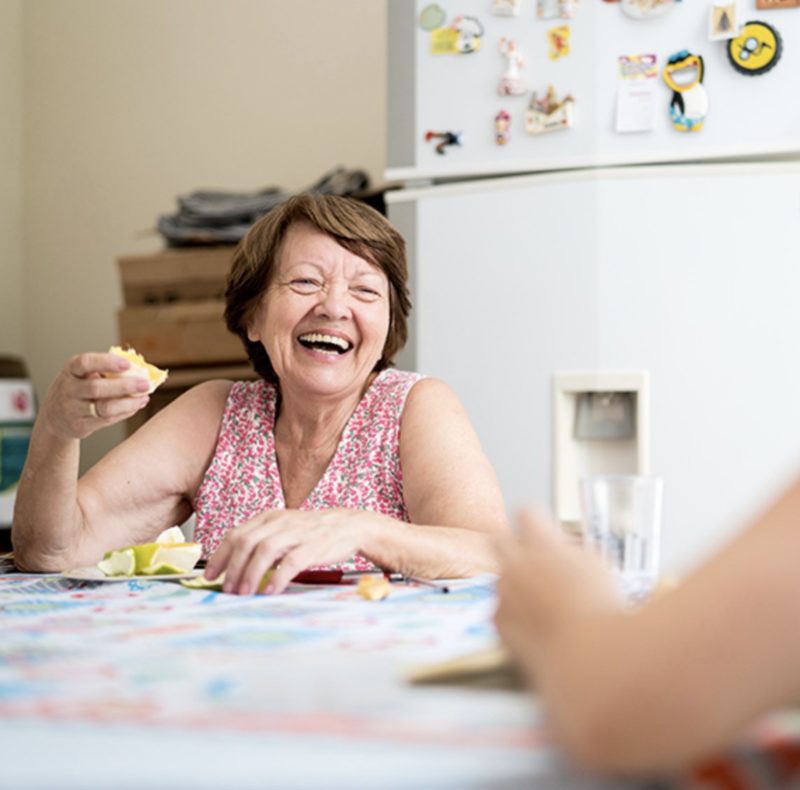Caregiving in Crisis: Resources for Families and Caregivers Feeling The Effects of COVID-19

At Vibrant Emotional Health, we understand that the coronavirus pandemic has presented an array of mental health challenges for people at all stages of life. Our goal is to support the full spectrum of mental wellness to help everyone receive emotional support and care when, where, and how they need it. This is where we come in; whatever your situation is, we want you to know that Vibrant is here to help, ensuring that every community feels supported throughout the year.
There are unique mental health concerns for the families and caregivers that support older adults, especially in this time. For caregivers, it’s completely normal to be asking yourself questions like, “How can I support my loved one while physical distancing?” and “What can I do to manage my own stress while taking care of someone else?” We want to answer these concerns and provide access to tips, tools, and information to keep you and your loved ones safe. Here are a few important things for families and caregivers to keep in mind.
Practice self-care
It can be difficult to take care of yourself when you’re worried about the wellbeing of someone else. But it’s important to maintain your health by taking the proper precautions, staying informed, and most importantly, giving yourself a break. Caregivers can experience mental burnout and fatigue, especially while working through their own crisis-related stress. If you are experiencing emotional distress or need guidance on coping mechanisms, our Staying in Balance toolkit is an extremely powerful resource for anyone that works with people in the community, including human and social services, civic and arts organizations, and many others in the nonprofit sector. There is even a module specifically targeting older adults. Vibrant also offers Safe Space, a self-help online platform with immediate access to a lifeline, coping tools, and interactive distraction techniques to take your mind off of things in an emotionally safe environment.
Stay physically active
Maintaining physical distancing does not prohibit people from moving around and remaining active inside their homes and outdoors during this time. For older adults that have lost access to their fitness or community center, it’s important to get creative and try to translate some of what they are missing into their current environment. Remember, any amount of movement will be beneficial. Even a short walk while wearing a mask can improve mental clarity, energy, and mood. If possible, being in the presence of nature is a huge stress reliever that can be done routinely.
Vary your coping strategies
While going for a run today may help you momentarily forget about the pressures of everything happening, that doesn’t necessarily mean that running will be the most effective coping strategy for you tomorrow. It’s important to take an active role in your coping and acknowledge that there isn’t a universal fix if you’re feeling distressed. One opportunity that can be extremely productive for caregivers of older adults is to keep doing the activities that they enjoy wherever possible. It’s also a great time to pick up old hobbies or learn new skills if you have the time, resources, and interest. Anything that offers incremental growth is great for mental health, but don’t feel added pressured to try something new.
Explore different ways to engage
In the face of this current pandemic, many caregivers are unable to to visit their loved ones and are searching for new ways to stay in touch and provide support. While shifting to digital forms of communication with video on smartphones or laptops has become increasingly popular, a phone call or a letter by mail are also valuable ways for caregivers and family members to maintain personal relationships, not only with the older adults in their lives but with other loved ones and community members.
Prepare for life after quarantine
It’s important for anyone considering a return to routine activities to pay attention to health guidelines while also taking into account their unique circumstances. If you are feeling overwhelmingly anxious and it is interfering with what you want to do, that is an indicator that you should consider reaching out for some extra support to aid in your coping.
Vibrant is here to help
Sometimes the demands of caring for someone else can add additional stress on caregivers, with the weight of their health riding on your actions. It’s okay to admit that you need extra support and are feeling fearful or anxious about your current situation. Our mission is to help everyone achieve emotional wellbeing with dignity and respect.
Vibrant offers several internal resources for immediate relief including SAMHSA’s Disaster Distress Helpline which provides 24/7, 365-day-a-year crisis counseling and support. Vibrant’s Safe Space platform includes a lifeline crisis chat, connecting individuals with counselors for emotional support and other services via webchat. You can also access Vibrant’s interactive coping and distress tools on Safe Space, backed by evidence-based research to support emotional wellbeing. If you are wary of using a crisis service, SafeSpace is built to be a more
self-supportive, private platform for seeking help.
If you are interested in proactively improving your self-care, try our Staying in Balance Toolkit. Here you will find the opportunity to build a self-care action plan, targeted at identifying symptoms of stress, relaxation techniques, self-care assessment checklists, and a comprehensive list of Vibrant’s resources.
For more of Vibrant’s COVID-19 related tips and tools visit our Supporting Your Emotional Wellbeing During the COVID-19 Oubreak page.
Comments are closed here.